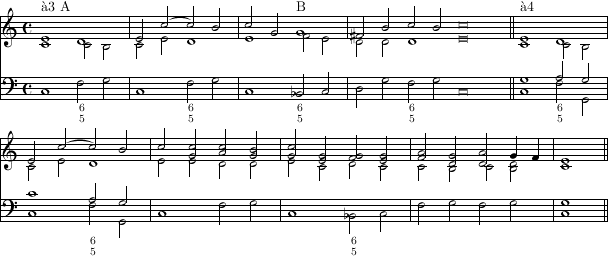|
[p. 6] Concentus semisextilis oder halber Sextil ist ein Grieff, welcher
zugleich die Quint und die Sext miteinander nimbt, zu welcher, so man mit mehr
als 3 Stimen schlagt, die Terz sich gesellet, ia, die Octav auch.
|
Concentus semisextilis or half sextil is a Grieff
which takes the fifth and the sixth together at the same time, to which the
third is added and also the octave when one plays with more than three voices.
|
Le concentus semisextilis ou demi sextil est un
Grieff formée de la quinte et de la sixte en même temps, à laquelle
s'ajoute la tierce et aussi l'octave quand on joue à plus que trois voix.
|
|
Hat also dieser Grieff die Terz, Quint, Sext und Octav als ihm zugeeignete
Consonantien.
|
Thus, to this Grieff belong the third, the fifth and the octave as its
own consonances.
|
Donc, ce Grieff est constituée de la tierce, la quinte, la sixte et
de l'octave en tant que consonances propres.
|
|
Die Quint ist fast die nothwendigste, hernach die Sext, die Octav ist die
schlechtigste zu schätzen und kann gar wohl ausbleiben.
|
The fifth is almost the most necessary, afterwards the sixth, the octave is the
least and may well be left out.
|
La quinte est la plus nécessaire, puis la sixte; l'octave est la moins
importante et peut être omise.
|
Ja, wann der Baß in ein mi oder harte Noten [geht], absonderlich ein frembde
Diesis  ist, soll die Octav vermeidet werden, es ware dann, daß man
gar zu völlig accompagnieren müßte. ist, soll die Octav vermeidet werden, es ware dann, daß man
gar zu völlig accompagnieren müßte.
|
And when the bass [goes] into a mi or a hard note, especially when this
is a foreign diesis  , the octave has to be avoided, except on has to
play a very full accompaniment. , the octave has to be avoided, except on has to
play a very full accompaniment.
|
En particulier quand la basse [va] sur mi ou sur une note dure, surtout
quand il s'agit d'un dièse  étranger, l'octave doit être evitée,
sauf quand on doit accompagner de manière très pleine. étranger, l'octave doit être evitée,
sauf quand on doit accompagner de manière très pleine.
|
|
In diesen Concent soll, wann es möglich ist, die Quint durch den vorigen Grieff
gebunden oder vorbereitet werden, also daß [man] die Stimme, so die Quint
machen soll, schon in vorigen Grieff eben dieselbe Noten oder Clav, so die
Quint abgeben wird, in der Hand haben.
|
In this chord one should, if possible, tie or prepare the fifth by the
previous Grieff, such that the voice, which will have the fifth,
already has this same note in the hand, which will become that fifth.
|
Dans ce Grieff on doit, si possible, lier ou préparer la quinte dans
l'accord précédent, de manière à ce que la voix qui fera entendre la quinte
dans l'accord suivant soit déjà sur la note qui deviendra cette quinte.
|
|
Exempel A. Wo dieses aber nit möglich ware, da nemblich die vorige Grieff
dieselbe Noten, so in Semisextili die Quint werden sollte, nicht leydet, soll
man doch zu gemelter Quint gradatim nacheinander staffelweis und nit durch ein
Sprung hinkommen.
|
Example A. Where this is not possible, since the previous Grieff does
not permit that note which will become the fifth in the semisextili,
one should descend gradually to te mentioned fifth in steps and not by a jump.
|
Exemple A. Quand ce n'est pas possible, parce que le Grieff
précédent ne supporte pas la note qui va devenir la quinte dans le
semisextili, on doit descendre vers la quinte mentionnée de manière
conjointe et pas par un saut. |
|
B. Ob die Quint aber gebunden oder gradatim geschlagen worden, soll sie
allezeit in nachkomenden negsten Grieff durch eben dieselbe Stime, so die Quint
gehabt hat, abwerts gradatim absteigend claviert werden.
|
B. Has the fifth been tied or was it reached gradually, it should always be
played gradually descending in the following Grieff in the voice which
had the fifth.
|
B. Que la quinte soit liée ou jouée conjointement, elle doit toujours être
amenée par un mouvement descendant dans le Grieff suivant.
|
|
A.B. In [Semi=]Sextili kann mit 3 Stimen allein, bisweilen die Sext ausbleiben
und an dero statt die Terz dienen, mit 4 oder mehr Stimen, können so wohl die
Terz als die Sext dupliert werden, die Quint aber nicht, sonderlich, da sie
gebunden wird.
|
A.B. When playing with three voices, one can sometimes leave out the sixth of a
[semi-]sextili and use the third instead, with four or more voices,
one can double the third as well as the sixth, but not the fifth, especially as
it is tied.
|
A.B. Quand on joue à trois voix, on peut omettre la sixte du
[semi-]sextili de temps en temps et la remplacer par la tierce; à
quatre voix ou plus, on peut doubler la tierce aussi bien que la sixte, mais
pas la quinte, surtout quand elle est liée.
|
 ist, soll die Octav vermeidet werden, es ware dann, daß man
gar zu völlig accompagnieren müßte.
ist, soll die Octav vermeidet werden, es ware dann, daß man
gar zu völlig accompagnieren müßte.
 , the octave has to be avoided, except on has to
play a very full accompaniment.
, the octave has to be avoided, except on has to
play a very full accompaniment.
 étranger, l'octave doit être evitée,
sauf quand on doit accompagner de manière très pleine.
étranger, l'octave doit être evitée,
sauf quand on doit accompagner de manière très pleine.

